July 2023

In the Caribbean Fishery Management Council (CFMC)'s bulletin you will find announcements, facts about marine species, and valuable information on fishing and regulations that rule this activity in Puerto Rico and the US Virgin Islands.

CFMC UPDATES SUSTAINABLE SEAFOOD CELEBRATION

The Sustainable Seaf Celebration (formerl known as the Fish Fr took place this past J 7th, 2023, in Washin DC. This activity take place annually since and is aimed at prom properly managed fis seafood as well as m aquaculture within U States jurisdictions.
Several agencies participate in this act including Fishery Management Region Councils. Other participants include congresspersons, government representatives, non-profitorganizations, and other agencies related to fish and seafood management and production in the United States. The Caribbean Fishery Management Council (CFMC) has participated in this event for about 10 years. CFMC presence occurred in part thanks to the invitation extended by the West Pacific Fishery Management Council (WPFMC) and NOAA.
www caribbeanfmc com 01 / 05
(From left to right) Miguel Rolón, Diana Martinó, Dr. Richard W. Spinrad and Marcos Hanke.
Since the first year CFMC began participating in this activity, Culinary Arts teacher and chef Juan Carlos Vicéns has been in charge of creating recipes and preparing the dishes served in our booth In this event, he was joined by chef Dr. Wanda I. Pantojas (Professor in the Hotel and Restaurant Management School in UPR-Carolina), chef Giovani Romero, and chef Wilnelia Rivera.
Also present were Mr. Miguel A. Rolón, CFMC Executive Director, and Ms. Diana Martinó, Assistant to the Executive Director and Education an Extension Coordinator. M Martinó has been the person organizing CFMC participation since the beginning. Her work has led to chef coordination, recipe selection, the selected fish and seafood and NOAA collaboration.
CFMC President, Captain R Sea Grant) also participated in this activity and helped procure local seafood and decorate the exhibition booth and tasting area.
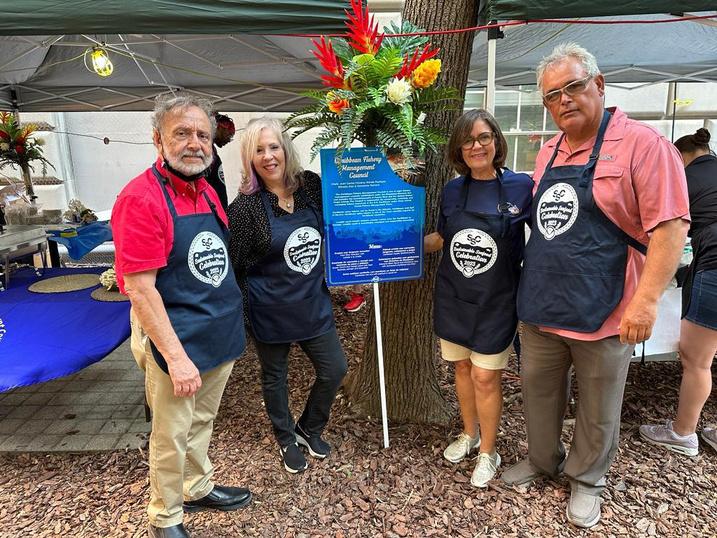

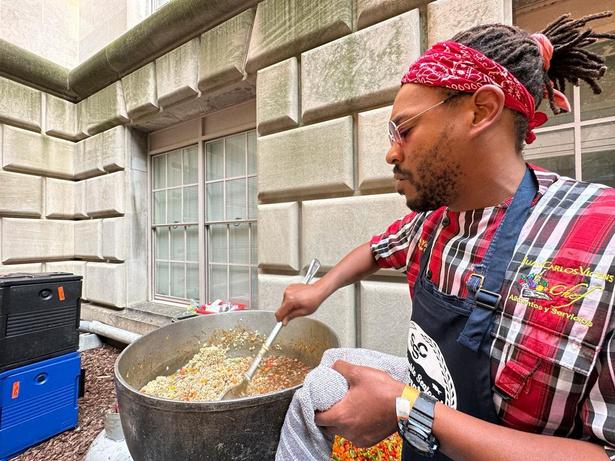

www caribbeanfmc com 02 / 05 July 2023 CFMC UPDATES
Chef Giovanni Romero
(From left to right) Chefs Giovanni Romero, Wilnelia Rivera and Wanda I Pantojas
(From left to right) Miguel Rolón, Diana Martinó, Jannette Ramos and Marcos Hanke
Among the hundreds of people who approach Richard W. Spinrad, NOAA Administrator; Mr Subsecretary; Mr. Samuel D. Rauch, Assistant
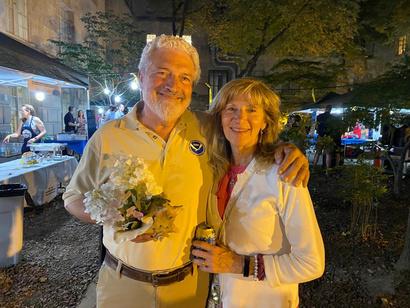
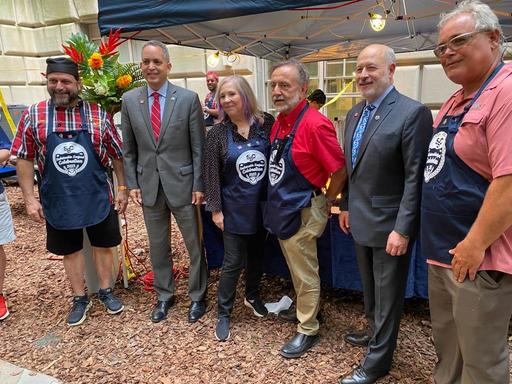
Programs; and Ms.
Administrator for NOAA Fisheries. All of
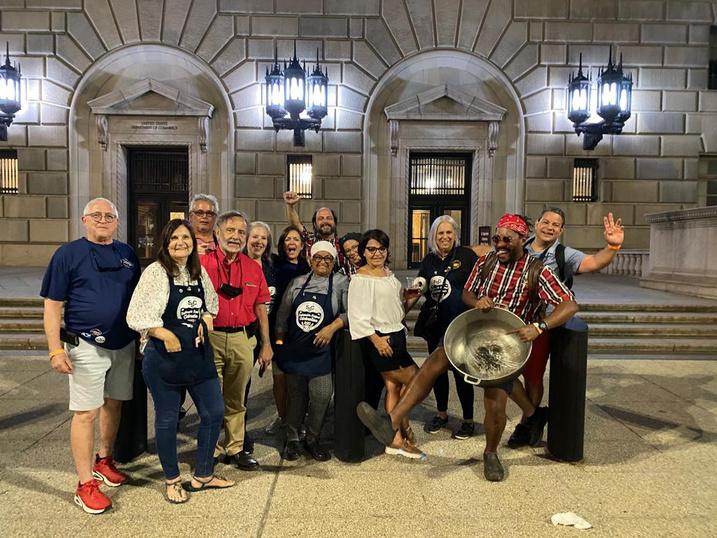
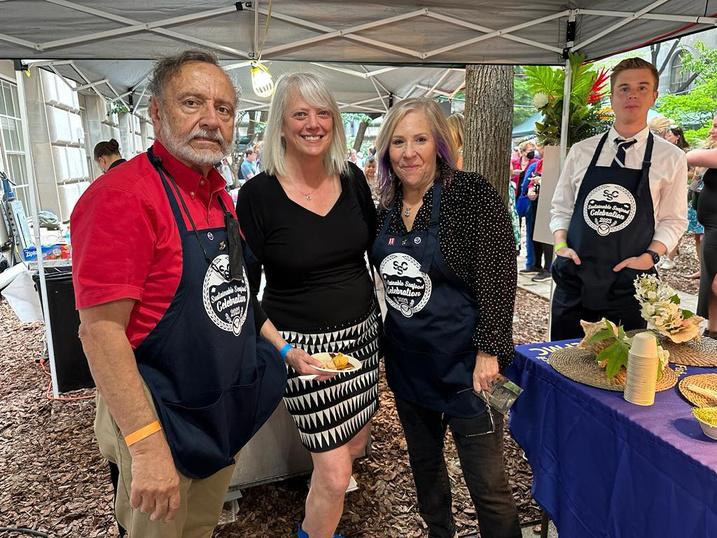
enjoyed the presented plates and e d CFMC t ti th i ti i tion in this event.
Octopus, lobster, squid, an queen conch were part of delicious seafood prepared served in this activity Sev the recipes used were take straight from the Fish and Seafood Recipes for Underu Species of PR & the USVI, w allowed CFMC to continue promoting the book and g g visibility for the wide gastronomic variety of our region. Delicacies like wet rice with seafood and fideuà were some of the main courses, which were accompanied by fried breadfruit, plantain tostones, rice fritters, and arepas
We encourage you to find and do https://issu com/caribbeanfmc/d pp g p fish and seafood diversity. Bon Appetit!

NOTE: We would like to thank Miguel
for this article

www caribbeanfmc com 03 / 05 July 2023 CFMC UPDATES
Rolón, Diana Martinó, and Jannette Ramos for the information and photographs supplied
g
Janet Coit, Assistant
them
(From left to right) Chef Juan Carlos Vicéns, Don Graves, Diana Martinó, Miguel Rolón, Dr Richard W Spinrad, Marcos Hanke
(From left to right) Miguel Rolón, Janet Coit and Diana Martinó
(Top) 1. Miguel Rolón y Samuel D. Rauch; 2. Tim Tomastik and Nina Gibson; (Bottom) 3. Group of staff, chefs and collaborators of the CFMC.
ALEXIS LOYOLA GONZÁLEZ FISHER OF THE MONTH
Alexis Loyola is a commercial fisherman located in Cabo Rojo, Puerto Rico. Fishing was a pastime at first, and it eventually became his livelihood and sustenance.

“First, I bought a boat and began fishing as a hobby; I saw I could make a living out of this and became a commercial fisherman. I studied nursing I graduated and saw I could make a living from fishing and never actually worked as a nurse,” he told us.
Alexis does not come from a fishing family As a boy, he fished from the shore and later, when he became a commercial fisherman, he fished by freediving using a harpoon. When he began fishing deep sea snapper, his friend and colleague Alexis López was the one who taught him and showed him the equipment used in this type of fishing and how to use it. He told us how a large part of his fishing learning has been through experience and correcting past mistakes.
After more than 10 years of becoming a commercial fisherman, Alexis is proud of being able to survive on this career. He has a special permit for catching queen snappers, and silk and queen snappers are his main catches. Alexis fishes in the western area in Puerto Rico. He goes out to sea for several days and returns with his catch By focusing on fishing for several days in a row, he can spend quality time with his family when he returns.
“I can make a living by doing something I enjoy every day I have a lot of time to spend with my family I go out fishing 10-12 days a month. The rest of the time, I’m with my family. I have two daughters. To me, fishing is a hobby that is also my job, it’s a relaxing time for me. I fish far from the shore, there’s no signal, no communications; this is a time to disconnect from problems,” he expressed
We asked him if he’s noticed changes in the sea in the years he’s been active. He told us that “fish are further out; before, I could find fish at 180 fathoms, but now I go out to 230, 250 fathoms ” This worries him, because it means that he has to go further out to sea each time to fish.

Alexis offers the following advice to newer fishing generations: “Respect the closures There are many new fishers who don’t respect the closures and catch younglings. If I catch a small animal, I move to a different area. They don’t know the harm they’re doing by taking this juvenile fish, this is a juvenile that could have grown ”
Note: CFMC would like to thank Alexis Loyola González for the interview and the photo he provided.
July 2023 CFMC UPDATES www caribbeanfmc com 04/ 05
Alexis with his grey snapper catch.
EDUCATIONAL PROGRAM FOR
SALT WATER RECREATIONAL FISHING
Text and photography by Helena Antoun
PEPeR involves several modules focused on topics relevant to fishery resources. These topics include fishing laws and regulations in state and federal waters, regulated marine species, highly migratory species, fishery management, and how to participate effectively in management processes
EThese modules and lectures will take place in nautical clubs and fishing associations throughout Puerto Rico Eventually, they will be uploaded to a virtual platform through which people will be able to access the presentations and online resources from the comfort of their homes.
The lectures are offered upon request Interested people, fishing associations and nautical clubs can coordinate groups of 10 or more participants. They could also write us a message with their contact information and as soon as we reach quorum, a workshop will be coordinated.

Are you interested in PEPeR? Here’s the contact information:

Wilson Santiago: (787) 344-0956 wilson.santiago.cfmc@gmail.com
Helena Antoun: (939)-438-3123 helena.antoun@noaa.gov
www.caribbeanfmc.com
FIND US ON:
www caribbeanfmc com 05 / 05 July 2023 CFMC UPDATES
















